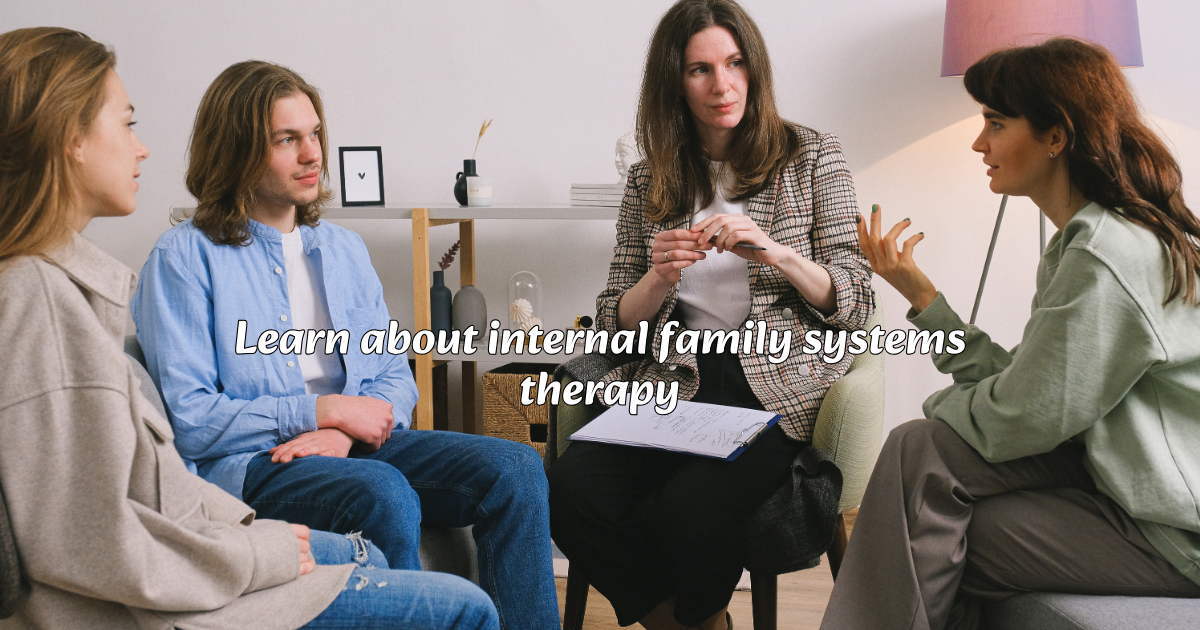Learn about internal family systems therapy
Discover Internal Family Systems Therapy: A Path to Inner Healing
Have You Ever Felt at War with Yourself? At times, you might notice conflicting thoughts and emotions pulling you in different directions, one part of you longs for success, while another fears failure. Perhaps you try to stay calm in stressful situations, yet an inner voice pushes you toward self-doubt or impulsive reactions. These internal struggles are not random; they are different “parts” of your psyche at work.
Table of Contents
What is Internal Family Systems (IFS) Therapy?
Internal Family Systems Therapy (IFS) is a revolutionary psychological approach that helps you understand and heal these internal parts. Instead of battling against negative thoughts or emotions, IFS encourages self-discovery, self-compassion, and deep emotional healing.
Why Should You Care About IFS Therapy?
Your mind operates like an internal family, some parts protect, some react, and others hold onto past wounds. When these parts are in conflict, it can lead to stress, anxiety, and emotional turmoil. IFS provides a structured method to bring balance and harmony, allowing you to become the leader of your inner world.
The Impact of Mental Health on Family Dynamics: Strengthening Relationships
What You’ll Learn in This Guide
This comprehensive guide will walk you through:
✅ The core principles of IFS Therapy
✅ How IFS helps with emotional healing and self-awareness
✅ Scientific research supporting its effectiveness
✅ Practical techniques to apply IFS in daily life
By the end of this article, you’ll have a clear understanding of how Internal Family Systems Therapy can transform your relationship with yourself and help you achieve emotional well-being. Let’s dive in!
What is Internal Family Systems (IFS) Therapy?
Understanding IFS Therapy
Internal Family Systems (IFS) Therapy is a transformative psychological approach that views your mind as a system of distinct internal parts, each with its own thoughts, emotions, and behaviors. Instead of seeing these parts as dysfunctional, IFS recognizes them as valuable elements of your inner world—each playing a role in protecting or responding to past experiences. By fostering self-awareness and self-leadership, IFS helps you achieve emotional balance and healing.
The Origins of IFS Therapy
IFS Therapy was developed in the 1980s by Dr. Richard Schwartz, a family therapist who noticed recurring patterns in his clients. He observed that people often described their struggles as internal dialogues—conflicting voices that influenced their decisions and emotions. Through his research, Schwartz discovered that these inner parts function similarly to members of a family system, each holding unique roles and responsibilities. This insight led to the creation of IFS as a structured therapeutic model.
How IFS Differs from Traditional Psychotherapy
Unlike traditional therapy, which often focuses on changing thoughts and behaviors, IFS takes a compassionate, non-pathologizing approach by:
🔹 Emphasizing Self-Leadership – You are not just a sum of your emotions; your “Self” has the power to heal and guide your internal system.
🔹 Viewing the Mind as a System of Parts – Instead of suppressing negative thoughts, IFS helps you understand and integrate them.
🔹 Encouraging Healing Over Control – Traditional therapy may focus on controlling symptoms, whereas IFS seeks to heal the underlying causes of emotional distress.
By working with rather than against your inner parts, IFS Therapy creates a path toward deep emotional healing and personal transformation.
The Core Principles of IFS Therapy
Multiplicity of the Mind: Embracing Your Inner Parts
At the heart of Internal Family Systems (IFS) Therapy lies the concept of multiplicity of the mind—the understanding that you are not just one single entity but a collection of different sub-personalities or “parts.” These parts represent various aspects of your emotional and psychological landscape, each playing a unique role. Some parts protect, some express deep pain, and others attempt to control your behaviors. In IFS, every part is viewed as valuable and worthy of understanding, rather than something to suppress or reject.
The Self as the Leader: The Guiding Force Within
In IFS, the Self is considered the central, wise, and compassionate leader within you. The Self is the core essence of who you are—deeply connected to your intuition, wisdom, and inner peace. It is the Self that can heal internal wounds by fostering balance and harmony among your parts. In a therapeutic setting, the role of the therapist is to help you connect with your Self and allow it to guide your inner system, leading to healing and growth.
How to Create a Mentally Healthy Home Environment for Your Family
The Three Types of Parts in IFS Therapy
In IFS, your internal world is made up of three primary types of parts:
- Exiles – These parts carry buried emotions, past trauma, and painful memories. Often vulnerable, exiles are locked away because they hold emotional pain that is difficult to face. Healing these parts involves safely allowing them to express their feelings and release the burden they’ve carried.
- Managers – These protective parts try to maintain control of your life by preventing emotional pain. Managers often try to avoid situations that could trigger vulnerability, fear, or hurt, leading to behaviors like perfectionism, overworking, or emotional detachment. Their role is to keep things in check, but sometimes this protection can lead to overcontrol.
- Firefighters – These parts react impulsively when an exile’s pain breaks through the surface. Firefighters act quickly to suppress or distract from emotional distress, often through extreme actions like binge eating, substance abuse, or emotional outbursts. While firefighters are attempting to help, their responses can be harmful in the long run.
Understanding the role of each part within you can help create a harmonious relationship between them, allowing you to heal from past wounds and reclaim your sense of self-control.
How IFS Therapy Works: The Healing Process
Healing through Internal Family Systems (IFS) Therapy is a structured yet deeply personal journey. Rather than suppressing emotions or battling negative thoughts, IFS helps you develop a compassionate relationship with your inner world. Here’s how the process unfolds:
Step-by-Step Breakdown of the IFS Model
1️⃣ Identify Your Internal Parts – The first step is recognizing the different voices within you. A therapist may guide you in noticing patterns, such as a critical inner voice (a Manager) or a part that reacts impulsively to stress (Firefighter).
2️⃣ Connect with Your Self – IFS teaches you to access your Self, the calm and compassionate core of your being. From this place of clarity, you can observe your parts without judgment.
3️⃣ Develop a Dialogue with Your Parts – Instead of pushing emotions away, you learn to communicate with them. Why is your inner critic so harsh? What is your anxious part trying to protect? This conversation fosters self-awareness and understanding.
4️⃣ Gain Trust & Understanding – As you engage with your parts, they begin to trust that your Self can lead. This trust allows them to relax, reducing inner conflict and emotional distress.
5️⃣ Unburdening: Releasing Past Trauma – Many parts, especially Exiles, carry deep emotional wounds. Through the unburdening process, you acknowledge these wounds, allowing your mind to release stored pain and function with greater ease.
How an IFS Therapist Guides the Healing Process
A trained IFS therapist serves as a supportive guide, helping you:
✔ Recognize patterns and behaviors linked to your parts
✔ Develop Self-leadership to bring balance to your internal system
✔ Safely explore and release past emotional burdens
✔ Cultivate self-compassion and inner harmony
The Power of Unburdening
At the heart of IFS therapy is unburdening—letting go of painful emotions and limiting beliefs that no longer serve you. Once your parts release their old roles, they can transform into positive forces that support your well-being rather than hold you back.
Through this process, IFS empowers you to heal from within, creating lasting emotional balance and a deeper connection with yourself.
Scientific Research & Effectiveness of IFS Therapy
Is Internal Family Systems Therapy (IFS) Scientifically Proven?
Yes! IFS therapy isn’t just a compelling psychological model—it’s backed by research showing its effectiveness in treating PTSD, anxiety, depression, and self-esteem issues. Studies highlight its ability to heal emotional wounds by fostering self-compassion and internal balance.
Studies Supporting IFS Therapy
🔹 Post-Traumatic Stress Disorder (PTSD): Research published in the Journal of Traumatic Stress found that IFS significantly reduces PTSD symptoms by helping individuals process and integrate traumatic memories.
🔹 Anxiety & Depression: A 2021 study in Frontiers in Psychology reported that IFS therapy improved emotional regulation and reduced symptoms of anxiety and depression in participants.
🔹 Self-Esteem & Self-Compassion: Studies indicate that by strengthening the connection to the Self, IFS enhances self-worth and reduces inner criticism.
How IFS Therapy Changes Brain Function
Neuroscientific research suggests that IFS therapy positively impacts brain activity by:
✅ Calming the amygdala – Reducing the brain’s fight-or-flight response associated with trauma and anxiety.
✅ Strengthening the prefrontal cortex – Enhancing self-awareness, decision-making, and emotional regulation.
✅ Improving neural integration – Helping different parts of the brain communicate more effectively, fostering inner harmony.
Real-World Success: Case Studies on IFS Therapy
🔹 Case Study: Overcoming Childhood Trauma – A 35-year-old woman with PTSD successfully used IFS therapy to process early childhood abuse, reducing panic attacks and improving emotional stability.
🔹 Case Study: Healing from Self-Sabotage – A corporate executive struggling with perfectionism and burnout found relief through IFS by recognizing and working with his inner Manager parts.
🔹 Case Study: Anxiety & Self-Acceptance – A young adult with severe anxiety learned to embrace their emotions rather than suppress them, leading to increased confidence and reduced social anxiety.
Why IFS is a Game-Changer
Unlike traditional therapy models that focus solely on symptom management, IFS heals the root cause of emotional struggles by integrating all aspects of the mind. Research continues to validate its effectiveness, making it an innovative and transformative approach to mental well-being.
Mental Illness: Supporting a Family Member with Mental Illness
The Life-Changing Benefits of Internal Family Systems (IFS) Therapy
Internal Family Systems Therapy (IFS) offers a powerful approach to emotional healing and self-discovery. By understanding and harmonizing your internal parts, you can experience profound psychological and interpersonal growth. Here’s how IFS can positively transform your life:
✅ Improved Emotional Regulation
Do you often feel overwhelmed by strong emotions? IFS helps you develop a healthier relationship with your feelings. Instead of being controlled by anxiety, anger, or sadness, you learn to acknowledge, understand, and manage emotions with greater ease.
✅ Enhanced Self-Awareness
Through IFS, you gain deep insight into your thoughts, behaviors, and triggers. By identifying and communicating with your internal parts, you cultivate a greater sense of clarity and self-understanding, allowing you to break free from negative patterns.
✅ Healing from Past Trauma
IFS is particularly effective for those carrying unresolved trauma. The therapy allows you to safely revisit and heal wounded parts (Exiles), releasing painful memories and emotional burdens. This process fosters true healing rather than temporary symptom relief.
✅ Better Relationships with Others
Your internal conflicts often influence how you interact with others. By harmonizing your inner world, you naturally improve communication, empathy, and emotional intimacy in relationships. Whether it’s friendships, family, or romantic partnerships, IFS helps you connect more authentically.
✅ Increased Self-Compassion
Many people struggle with an inner critic that fuels self-doubt and guilt. IFS encourages self-kindness by shifting your perspective from self-judgment to self-acceptance. As a result, you develop a stronger, more supportive relationship with yourself.
Why IFS is a Game-Changer
Unlike traditional therapies that focus on controlling emotions, IFS helps you embrace all parts of yourself, leading to lasting emotional balance and self-growth. Whether you’re seeking relief from past trauma, emotional distress, or simply want a deeper understanding of yourself, IFS provides the tools for profound transformation.
Who Can Benefit from Internal Family Systems (IFS) Therapy?
Internal Family Systems Therapy (IFS) is a versatile and transformative approach that can benefit a wide range of individuals. Whether you’re dealing with emotional distress, trauma, or simply seeking greater self-understanding, IFS can guide you toward healing. Here’s who can benefit from IFS therapy:
1. Individuals Struggling with Trauma, Anxiety, or Depression
If you’ve experienced past trauma or are dealing with anxiety or depression, IFS offers a compassionate path to healing. By addressing and integrating the emotional wounds carried by your Exiles, IFS helps you process trauma, manage anxiety, and reduce depressive symptoms.
🔹 Trauma Survivors: IFS allows you to safely explore buried emotions and release the pain stored in your system.
🔹 Anxiety: IFS helps you identify the parts of you that are anxious and develop healthier coping mechanisms.
🔹 Depression: By working with your internal parts, IFS fosters emotional balance, improving mood and self-esteem.
2. People Facing Inner Conflicts or Self-Sabotaging Behaviors
Do you find yourself repeatedly making decisions that go against your best interests? Self-sabotage is often driven by inner conflicts between parts of you that want different things. For example, your Manager may want success, but a Firefighter might react impulsively to avoid vulnerability.
IFS helps you identify these conflicting parts, understand their motivations, and bring them into alignment. This process leads to more thoughtful decision-making and reduced self-sabotage.
3. Therapists Integrating IFS into Their Practice
Therapists looking to expand their toolkit can greatly benefit from integrating IFS into their practice. IFS offers a powerful framework to help clients explore their inner worlds, resolve conflicts, and process trauma. It can be particularly effective for therapists working with clients who have struggled with traditional therapeutic methods.
IFS: A Path to Healing for All
Whether you’re dealing with personal struggles or simply seeking a more profound understanding of your emotional world, IFS provides an effective, compassionate approach to healing. This therapy empowers you to connect with your authentic self and live a more balanced, fulfilling life.
Techniques Used in Internal Family Systems (IFS) Therapy
Internal Family Systems (IFS) Therapy utilizes a variety of powerful techniques to help you understand, heal, and harmonize the different parts of your internal system. These methods are designed to promote self-awareness, emotional regulation, and deep healing. Let’s explore the key techniques used in IFS therapy:
1. Mapping Your Internal System
The first step in IFS is identifying the different parts that make up your internal system. By mapping these parts, you can understand their roles and how they interact. This process involves:
- Recognizing key parts, such as Exiles, Managers, and Firefighters
- Noticing internal patterns and how these parts influence your behaviors and emotions
- Observing parts without judgment, allowing you to gain insight into your internal world
2. Identifying & Dialoguing with Parts
Once you’ve identified your parts, the next step is engaging in dialogue with them. IFS encourages you to communicate with these parts in a compassionate and non-judgmental way. Techniques include:
- Asking questions to understand each part’s role and concerns
- Listening deeply to each part’s perspective, allowing you to empathize and connect
- Building trust with your parts, so they feel safe to reveal their true feelings and needs
This process fosters self-awareness, empathy, and resolution of inner conflicts, allowing your Self to lead and guide your internal system.
3. Guided Meditation & Visualization
Guided meditation and visualization techniques are often used to access deeper parts of your psyche. Through these exercises, you can:
- Relax deeply to quiet the mind and engage with your internal system
- Visualize your parts in a safe, neutral space, helping you connect with their energy and messages
- Allow your Self to lead through the visualization process, promoting healing and understanding
These techniques help you enter a state of awareness where your inner parts can speak freely, fostering a peaceful connection to your emotions.
4. Self-Compassion Exercises
Self-compassion is a central element of IFS. By cultivating kindness toward yourself, you can heal from past wounds and transform negative patterns. Techniques include:
- Loving-kindness meditation, focusing on sending compassion to your inner parts
- Reassuring your parts that you, as the Self, are here to lead with care and wisdom
- Forgiving yourself for past mistakes or emotions, allowing parts to release old burdens
By practicing self-compassion, you develop a healthier, more loving relationship with yourself, helping to integrate your parts and foster emotional well-being.
IFS: A Holistic Healing Approach
The combination of these techniques helps you recognize, understand, and harmonize your inner system. With a deeper connection to your inner world, IFS therapy empowers you to heal from trauma, resolve internal conflicts, and live a more balanced, fulfilling life.
Comparing Internal Family Systems (IFS) Therapy with Other Therapeutic Approaches
When choosing the right therapeutic approach, it’s important to understand the differences in focus, methods, and effectiveness for various issues. Below is a comparison of IFS Therapy, Cognitive Behavioral Therapy (CBT), and Psychoanalysis, three popular therapeutic models.
Aspect Comparison: IFS Therapy vs. CBT vs. Psychoanalysis
| Aspect | IFS Therapy | CBT (Cognitive Behavioral Therapy) | Psychoanalysis |
|---|---|---|---|
| Focus | Healing internal parts (Exiles, Managers, Firefighters) | Changing negative thought patterns to improve behavior | Uncovering unconscious thoughts, memories, and desires |
| Approach | Self-led healing through understanding and integrating parts of the self | Structured, goal-oriented steps to challenge and reframe thoughts | Free association and deep exploration of unconscious material |
| Best for | Trauma, emotional conflicts, self-sabotage | Anxiety, depression, stress management | Deep-rooted psychological issues, unresolved childhood trauma |
| Method of Engagement | Dialogue with internal parts, unburdening, self-compassion | Identifying and changing distorted thoughts and beliefs | Long-term exploration of unconscious mind, dreams, and past experiences |
Key Differences
- IFS Therapy focuses on recognizing and integrating internal parts of the self, particularly helpful for healing trauma and resolving emotional conflicts. It emphasizes self-leadership and self-compassion, providing a holistic approach to emotional healing.
- Cognitive Behavioral Therapy (CBT) works by addressing distorted thinking patterns and changing behaviors. It’s highly structured and effective for short-term treatment of anxiety, depression, and stress by challenging negative thoughts and beliefs.
- Psychoanalysis, on the other hand, dives deeply into the unconscious mind, exploring childhood experiences and unresolved conflicts. It’s ideal for long-term, in-depth work with deeply ingrained psychological issues, but may require years of therapy.
Which Therapy is Right for You?
- If you’re struggling with trauma, inner conflicts, or self-sabotage, IFS therapy can provide a compassionate, self-led path to healing.
- If you’re dealing with anxiety or depression and prefer a more structured, goal-oriented approach, CBT may be a great choice.
- For those with deep-rooted psychological issues or unresolved past experiences, psychoanalysis can offer long-term insight into the unconscious mind.
In Summary
Each therapy has its strengths depending on your needs. IFS Therapy stands out for its focus on emotional harmony and trauma healing through understanding and integrating the parts of yourself.
FAQs About Internal Family Systems (IFS) Therapy
What is the goal of Internal Family Systems Therapy?
The primary goal of Internal Family Systems Therapy (IFS) is to help individuals reconnect with their “Self”—the calm, compassionate leader within. Through this connection, you can achieve harmony within your internal system by integrating the different parts of your personality. This promotes emotional healing, better self-awareness, and reduced internal conflict.
How long does IFS therapy take to work?
The duration of IFS therapy varies depending on the individual and their unique challenges. However, many people report noticeable improvements within a few months, particularly in terms of emotional regulation and self-compassion. For deeper, more complex issues, therapy may take longer, with lasting results building over time.
Is IFS therapy backed by science?
Yes! IFS therapy is supported by a growing body of research. Studies have shown that it is particularly effective for treating PTSD, anxiety, and emotional dysregulation. Research also suggests that IFS can improve self-esteem and emotional resilience, making it a scientifically validated approach to emotional healing.
Can I practice IFS therapy on my own?
While working with an experienced IFS therapist can be incredibly helpful, many of the IFS techniques can be used for self-healing. Practices like identifying your parts, engaging in self-compassion exercises, and using visualization can be powerful tools for personal growth. However, it’s recommended to consult a therapist if you’re dealing with deep trauma or emotional conflicts.
Conclusion: Embrace Healing Through IFS Therapy
Internal Family Systems Therapy (IFS) offers a transformative approach to emotional healing and self-discovery. By exploring your inner world and understanding the different parts of yourself, IFS helps you bring harmony to your internal system, heal from past trauma, and cultivate self-compassion.
Whether you’re facing emotional conflicts, trauma, or simply seeking greater self-awareness, IFS provides the tools for personal growth and lasting change. With its scientifically-backed methods and compassionate approach, IFS empowers you to lead from your “Self”, making peace with all parts of who you are.
If you’re ready to begin your journey toward emotional balance and healing, consider exploring IFS therapy further. Whether through self-practice or by working with a skilled therapist, you have the power to create a deeper connection with yourself and transform your life.
Resources for Further Reading & Professional Help
- Books:
- “Internal Family Systems Therapy” by Richard Schwartz
- “Introduction to the Internal Family Systems Model” by Richard Schwartz
- Websites:
- IFS Institute
- National IFS Community
- Find a Therapist:
- Use directories such as Psychology Today or TherapyRoute.com to find licensed IFS therapists in your area.







